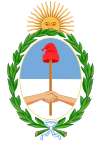
A prosecutor is a legal representative of the prosecution in states with either the common law adversarial system or the civil law inquisitorial system. The prosecution is the legal party responsible for presenting the case in a criminal trial against the defendant, an individual accused of breaking the law. Typically, the prosecutor represents the state or the government in the case brought against the accused person.

The Public Prosecutor's Office is the Brazilian body of independent public prosecutors at both the federal and state level. It operates independently from the three branches of government. It was once referred to by constitutional lawyer and former president Michel Temer as a "Fourth Branch". The Constitution of 1988 divides the functions of the Public Prosecutor's Office into three different bodies: the Public Procurator's Office, the Public Defender's Office and the Public Prosecutor's Office itself, each one of them an independent body. In addition to that, the new Constitution created the Federal Court of Accounts, which is also autonomous in its functions.
The order of precedence in Argentina is a symbolic hierarchy of officials used to direct protocol. It is regulated by Presidential Decree 2072 of 10 October 1993, signed by then President Carlos Menem, and former ministers Guido di Tella and Carlos Ruckauf.

The Ministry of Foreign Affairs, International Trade and Worship, informally referred to as the Chancellery, is the Argentine government ministry dealing with the foreign relations of Argentina, Argentina's foreign policy, international development, international trade, diaspora and matters dealing with Mercosur and the Catholic Church.
The Public Prosecutor's Office of Costa Rica is the authority responsible for the legal prosecution of criminal acts within the state's legal system. It organises the investigation and prosecution of crimes affecting broader society. In investigating crimes, it works jointly with the Judicial Investigation Department.
The International Commission against Impunity in Guatemala was an international body charged with investigating and prosecuting serious crime in Guatemala. On January 7, 2019, the agreement between the United Nations and Guatemala was terminated by Guatemalan president Jimmy Morales, evoking CICIG's alleged participation in illegal acts, abuse of authority and acts against the constitution. The UN rejected this unilateral termination, and the country's highest law court ruled against the president's decision CICIG's term was scheduled to end in September 2019. Morales' decision, approved by the country's business elite, triggered an institutional crisis in Guatemala, as the Constitutional court sided with CICIG. Morales is being investigated concerning his campaign financing.

The Route of the K-Money was a 2013 journalistic investigation into political corruption in Argentina. It began with reports on the Periodismo para todos television program hosted by journalist Jorge Lanata. The investigation was named "the route of the K-Money" to imply that former presidents Néstor Kirchner and Cristina Fernández de Kirchner were involved. The investigation showed embezzlement had taken place and suggested the money trail involved Néstor Kirchner, Cristina Fernández de Kirchner and an alleged partner, businessman Lázaro Báez. The journalists concluded that Báez diverted money intended for public infrastructure to tax havens. The television show led to an official investigation. In April 2016, Lázaro Baez was arrested for corruption charges and jailed in the Ezeiza Federal Prison Complex awaiting trial. In mid-2020 he was transferred to house arrest as the proceedings were put on hold due to the COVID-19 pandemic. In 2021, Báez was sentenced to 12 years in prison for money laundering. In June 2023, a separate case looking into possible wrongdoing by Cristina Kirchner was dismissed after the prosecution failed to produce evidence.

Luisa Marvelia Ortega Díaz is a Venezuelan lawyer. Between December 2007 and August 2017, she served as the Prosecutor General of Venezuela. A proponent of the Chavismo ideology, Ortega Díaz was fired as Prosecutor General on 5 August 2017 by the Supreme Tribunal of Justice and the Constituent National Assembly (ANC) promoted by Nicolás Maduro, following a breaking with the Maduro government as a result of the 2017 Venezuelan constitutional crisis in the context of the crisis in Venezuela. This dismissal was rejected by the opposition-led National Assembly of Venezuela, arguing that only that institution had the power to carry out said removal according to the Constitution, and cataloging the Prosecutor as the only legitimate authority of the Public Ministry. As a result, she is called by the National Assembly, the Supreme Tribunal of Justice of Venezuela in exile and some media outlets as the Prosecutor General of Venezuela in exile.
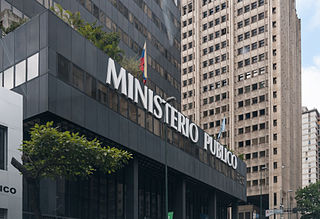
The Public Ministry of Venezuela is an organ belonging to Citizen Power, it has autonomous and independent character. It is under the direction of the Attorney General of the Republic who is elected by the National Assembly for a period of seven years.
The following lists events that happened during 2015 in Argentina.
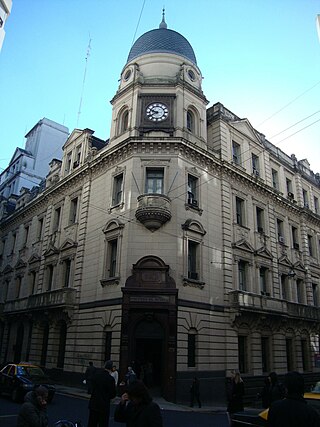
The Ministry of the Interior of Argentina is a ministry of the national executive power that manages issues pertaining to domestic politics such as immigration and co-ordination between the federal government and the governments of the provinces of Argentina.

The Ministry of Culture of Argentina is a ministry of the national executive power that oversees the government's public policy on the culture of Argentina.

The Presidency of Mauricio Macri began on 10 December 2015, when Mauricio Macri was sworn into office on 10 December 2015 to a four-year term as President of Argentina. Macri took office following a 51.34% to 48.66% runoff ballotage win over Daniel Scioli in the 2015 general election. He is Argentina's first democratically elected non-Radical or Peronist president since 1916. In elections of October 2019, he lost his re-election bid for a second term and was succeeded by Alberto Fernández as president. Macri is also the first incumbent president in Argentina and South America's history to be unseated by a challenger and not reaching a second term.

The Attorney General of the State(Spanish: Fiscal General del Estado), or also, Prosecutor General, is the head of the Prosecution Ministry, the body with functional autonomy in the Judiciary, that has constitutionally been entrusted with the promotion of the action of the justice in defense of the legality, protecting citizens rights and the public interest, and ensuring the independence of the courts and to seek the satisfaction of the social interest.
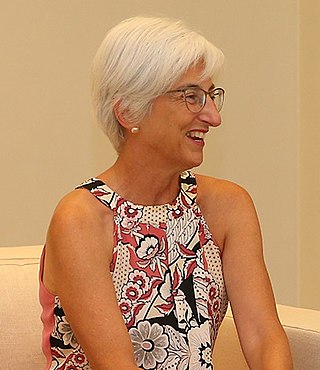
María José Segarra Crespo, is a Spanish jurist, Attorney General between 2018 and 2020. She began her career in the prosecutor's office in 1987. From 2004 to 2018 she was in charge of the Prosecutor's Office of Province of Seville.
The Office of the Attorney General of the Nation of Panama is responsible for investigating and suppressing crimes. Likewise, the office is an autonomous entity— as it does not belong to either the Executive, Legislative or Judicial Branch. Due to the constitutional and legal power to exercise the action of the Panamanian state, the office participates in the administrative process of justice and even monitors public officials. The Attorney General is the superior head of the Public Ministry of Panama.
The Public Ministry of Nicaragua ensures effective criminal prosecution. Established in 2000, the ministry exercises vigilance and protection of society and victims of crime by promoting the investigation of criminal acts and criminal actions against offenders of the law that violate public order and security. It is an independent institution that operates via a functional and administrative organic autonomy and is subordinated only to the Political Constitution of the Republic and the laws. The Attorney General of the Republic heads the ministry.
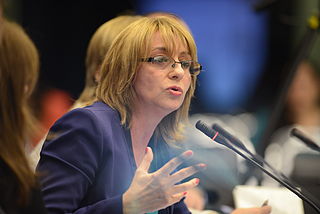
Alejandra Magdalena Gils Carbó is an Argentine jurist who served as the country's Attorney General from 29 August 2012 to 31 December 2017, during the administrations of Cristina Fernández de Kirchner and Mauricio Macri.

Zoraida Ávalos Rivera is a Peruvian jurist who served as the country's attorney general from 8 January 2019 to 30 March 2022.

Liz Patricia Benavides Vargas is a Peruvian lawyer. On June 20, 2022, she was elected as the Peruvian attorney general.
